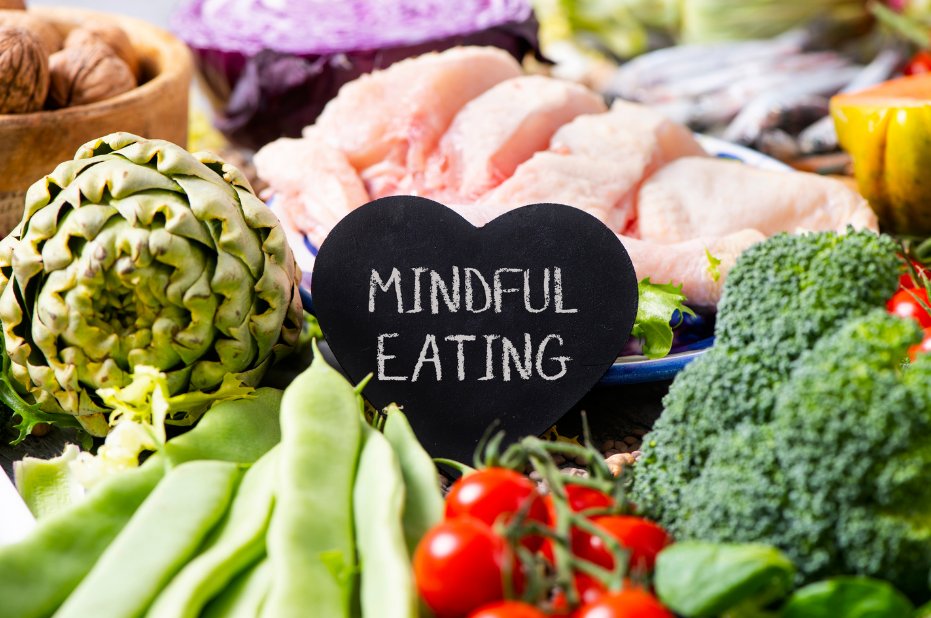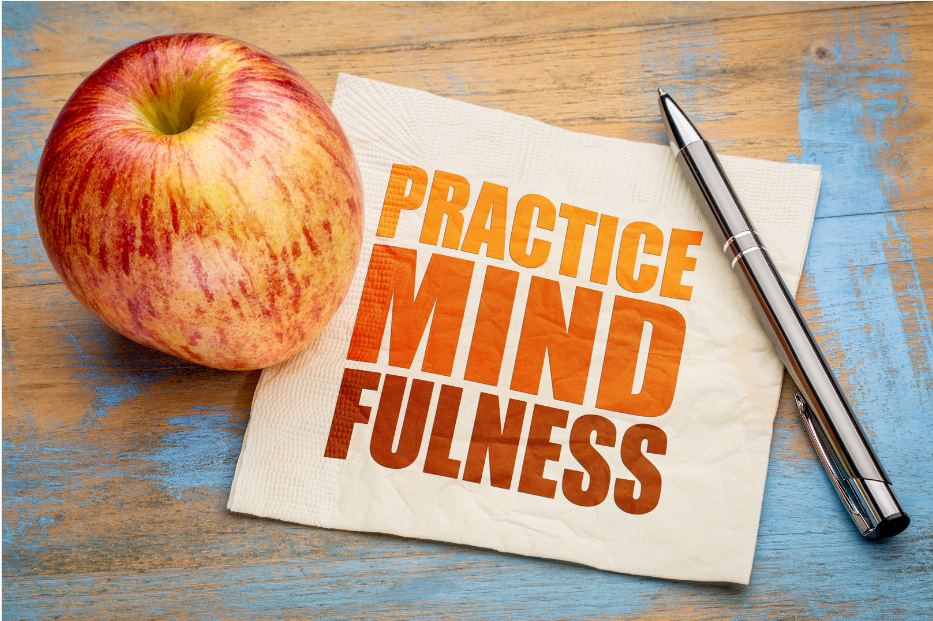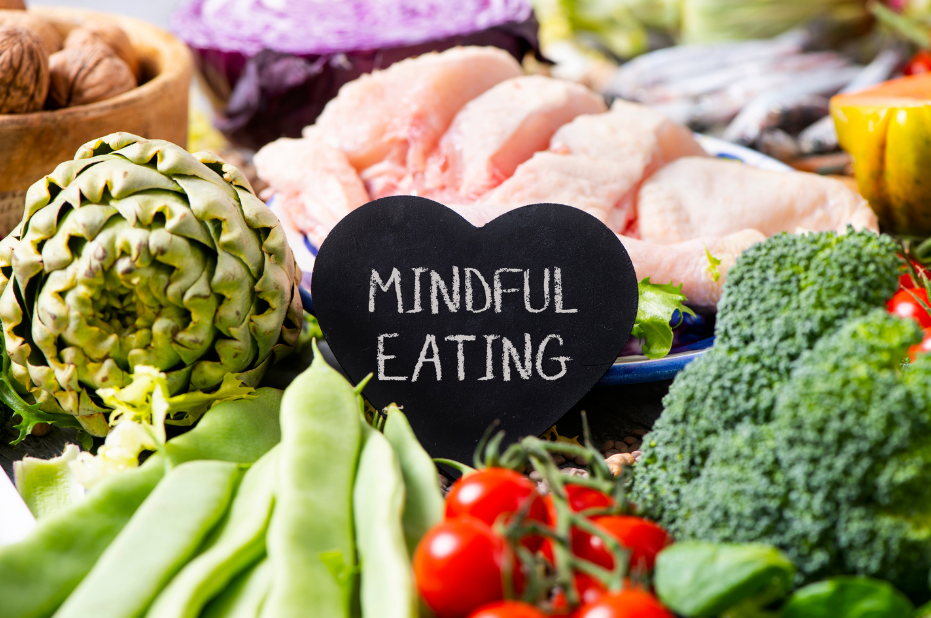By Kelly Jo Zellmann, MS, RDN, LD, CLT
Do you wonder what it means to actually be a mindful eater or “eat mindfully?” Mindful eating is another tool you can have in your well-being tool-box along with intuitive eating. However, there often are many misconceptions when it comes to mindful eating. First of all, mindful eating is not about eating healthier, better, or weight loss, and it’s not just about slowing down and savoring each bite of food. Mindful eating is about eating with intention and paying attention to what you are eating and changing your mindset and relationship around food and your body. It’s about noticing the “how” and “why” we eat and allows us to appreciate the food we eat more. The art of mindfulness and mindful eating can positively change the way you engage with not only food but other aspects of your life. The skill of mindful eating can also be used to complement the 10 principles of intuitive eating.

So, let’s start by understanding what mindful eating is.According to The Center for Mindful Eating:
- Mindful eating allows yourself to become aware of the positive and nurturing opportunities that are available through food selection and preparation by respecting your own inner wisdom.
- Mindful eating uses all your senses in choosing to eat food that is both satisfying to you and nourishing to your body.
- Mindful eating acknowledges responses to food (likes, dislikes or neutral) without judgment.
- Mindful is becoming aware of physical hunger and satiety cues to guide your decisions to begin and end eating.
Similarly, to mindfulness, which is defined as the “awareness that arises through paying attention, on purpose, in the present moment, non-judgmentally,” there are many benefits to mindful eating.
Increased Food Enjoyment
How many times are we eating on the go or while multi-tasking these days working from home on the job or in the car? While the pandemic has forced us to be eating more meals at home, that doesn’t mean we have less distractions or are paying more attention to what we are eating. In fact, it may even pose more challenges since food is available 24/7 versus having to plan or leave to get meals if you are at work. It may be easier to mindlessly eat when you’re sitting at your computer all day and “breaks” seem to happen in the kitchen more frequently than while at the office.
More Satisfaction with eating and mealtimes
Mindful eating tends to equate to increased satisfaction with eating and mealtimes. Are you eating for satisfaction or just eating as another task on your to-do list? If you can just take a few seconds to pause and notice your environment around eating before you start to eat, you may discover that there are little things you can do to improve your satisfaction. Notice any distractions such as maybe putting your phone away or shutting off the T.V. By doing so, you may be able to notice what your taste buds are telling you about the flavor and texture of the foods you are eating and/or if it’s really satisfying what you are wanting or are hungry for at that moment. Pausing will also allow you to check in and notice your hunger level and any cues your body may be telling you. The more you can pause and check in, the more in tune you will be with your body and the food you are eating, which will result in increased satisfaction with food.
Improved Health Outcomes
There is a lot of research from a variety of patients ranging from diabetes to disordered eating that supports mindful eating with positive outcomes including decreased emotional eating, binge eating, depression or anxiety and emotional stress. It is also associated with healthier food choices and improved blood sugar control. There are also many programs and studies that correlate mindful eating with lower body weight. However, mindful eating is NOT intended for weight loss, since that is an outcome that reflects diet culture’s obsession with thinness and health status. Focusing on weight and weight loss takes the mind off of the present moment and it is harder to maintain a non-judgmental approach to eating.

Steps to achieving a Mindful Eating Mindset
There are several simple steps you can take to adopt a more mindful eating mindset.
Slow Down and Press Pause
One of the first steps in eating more mindfully is to press pause and be more present. Studies have shown that just by eating foods more mindfully, it is more likely that the food will be more enjoyable. You may even get more food enjoyment eating something you aren’t crazy about when eating more mindfully. You can do this by engaging all your senses with eating. Pay attention to the sounds, colors, smells, tastes, and textures of the food(s) you are eating and how you feel. Maybe you need a cue to slow down before or when you start eating such as purposefully eating in a certain place versus eating in the kitchen. Or, sometimes taking a few deep, calming breaths can allow you the time needed to check in with your body before eating. Have you ever felt sick after eating a meal super fast? Just by slowing down before you eat allows our digestive system to get ready to eat, which results in enhanced digestion and absorption. Also, by pressing pause and slowing down, you’ll be able to notice your level of hunger and fullness much better.
Progress not Perfection
One thing to keep in mind is that mindful eating is not a diet, therefore, there is no perfect way to follow it. There is no on or off, you just are in the moment. You are in charge of choosing what you want to eat, honoring it and letting go of any feelings of guilt or shame. So many people struggle with wanting to eat perfectly in order to be healthy or achieve a certain weight. Well, guess what. There is no perfect way of eating and a certain number on the scale does not mean you are automatically healthy. Well-being and health are so much more than what diet culture leads us to believe. Mindful eating can help overcome some of your old food rules and ideas and challenge them with a new way of thinking. Think about how children eat intuitively (ie – they internally know when they are hungry and stop eating when full). We all have an inner child within us that knows exactly what we want to eat and how much. We just need to trust our bodies and reconnect with our inner child and experience food like children do. That doesn’t mean every meal and every bite of food is going to be the best thing ever or that we’re never going to overeat again. Mindful eating does not mean perfection, it is about progress, giving yourself grace and self-compassion. It is an ebb and flow and is a lifelong practice.
Food, Feelings, and Emotions
Emotions are a normal part of life and so is emotional eating. Contrary to what we hear and read about emotional eating as being “bad,” it is a normal part of eating and our relationship with food. We celebrate with food and we soothe with food. However, learning to eat more mindfully can help manage emotional eating if it feels out of control as we become more aware of our thoughts and feelings around food. Many people turn to food when stressed or feeling other negative emotions as a source of soothing and/or self-medication. Learning to first acknowledge and accept what and how you are feeling is key in discovering what unmet need you may have and determining how to meet that need. Mindful eating allows you to honor whatever food you may be craving and being present in the experience of eating without judging yourself. Give yourself permission to eat and be OK with it.
Hungry for More?
Remember, mindful eating is a skill and a tool you can use, but like intuitive eating, they both take practice. If you feel overwhelmed and not sure where to go, there are a lot of great resources to help get you started or help support you. Remember, there is no right or wrong way. If you want more information, check out the resources below.
Curious for more information, check out the resources below and/or contact Kelly Jo Zellmann, MS, RDN, LD at kellyjo@nutritiousweighs.com.
References/Resources:
- The Center for Mindful Eating: https://www.thecenterformindfuleating.org/StartMindfulEating
- Dr. Susan Albers: https://eatingmindfully.com/
- Tsui, V. (2018). The Mindful Eating Workbook. Althea Press.
- Bays, J. (2009). Mindful Eating. A Guide to Rediscovering a Healthy and Joyful Relationship with Food. Shambhala Publications, Inc.





